初中英语-情态动词can
中考英语二轮复习 语法专题情态动词 (讲义)
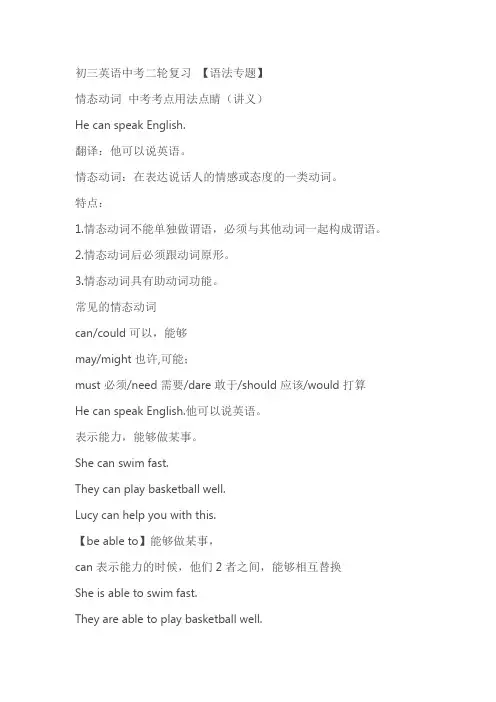
初三英语中考二轮复习【语法专题】情态动词中考考点用法点睛(讲义)He can speak English.翻译:他可以说英语。
情态动词:在表达说话人的情感或态度的一类动词。
特点:1.情态动词不能单独做谓语,必须与其他动词一起构成谓语。
2.情态动词后必须跟动词原形。
3.情态动词具有助动词功能。
常见的情态动词can/could可以,能够may/might也许,可能;must必须/need需要/dare敢于/should应该/would打算He can speak English.他可以说英语。
表示能力,能够做某事。
She can swim fast.They can play basketball well.Lucy can help you with this.【be able to】能够做某事,can表示能力的时候,他们2者之间,能够相互替换She is able to swim fast.They are able to play basketball well.Lucy is able to help you with this.He could write poems when he was 10. 翻译:他十岁时会写诗。
过去能够做某事,用,could来将其替换He could write poems when he was 10. 他十岁时就会写诗。
I could swim when I was seven years old. 我七岁的时候会游泳。
Leo could run fast when he was young. 利奥年轻的时候跑得很快。
在疑问句当中could 作为引导词出现——表达委外语气,请求做某事。
Could I have a drink我可以喝一杯吗?肯定回答只能用——Yes,you can. Could we meet again next week下周我们可以再见面吗?——Yes,we can.Could I come to see you tomorrow明天我能来看您吗?——Yes, you can.This news can't be true.翻译:这个消息不可能是真的。
初中英语语法之情态动词
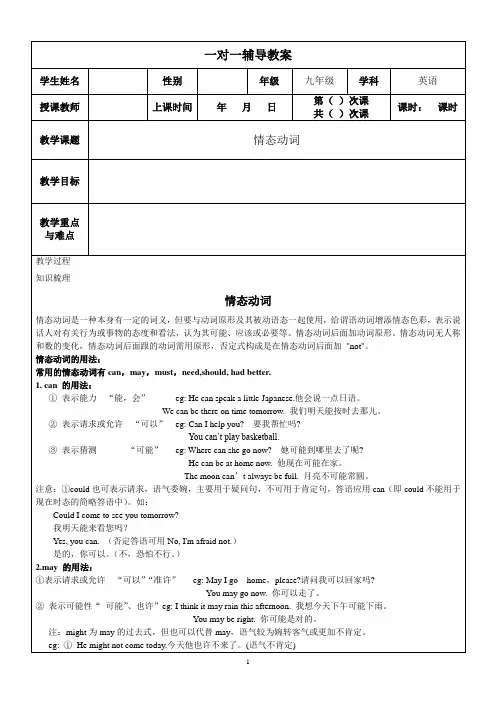
常用的情态动词有can,may,must,need,should, had better.
1. can的用法:
①表示能力“能,会”eg: He can speak a little Japanese.他会说一点日语。
We can be there on time tomorrow.我们明天能按时去那儿。
最大,其余依次递减。肯定句中表推测“一定,肯定”用must.
1.He must/can/may,might know the answer to this question.
他一定/可能/也许知道这个问题的答案。
2.It is cold in the room. They must have turned off the heating.
一对一辅导教案
学生姓名
性别
年级
九年级
学科
Байду номын сангаас英语
授课教师
上课时间
年月日
第()次课
共()次课
课时:课时
教学课题
情态动词
教学目标
教学重点与难点
教学过程
知识梳理
情态动词
情态动词是一种本身有一定的词义,但要与动词原形及其被动语态一起使用,给谓语动词增添情态色彩,表示说话人对有关行为或事物的态度和看法,认为其可能、应该或必要等。情态动词后面加动词原形。情态动词无人称和数的变化,情态动词后面跟的动词需用原形,否定式构成是在情态动词后面加"not"。
注意:①could也可表示请求,语气委婉,主要用于疑问句,不可用于肯定句,答语应用can(即could不能用于现在时态的简略答语中)。如:
Could I come to see you tomorrow?
最新版-英语情态动词专项复习
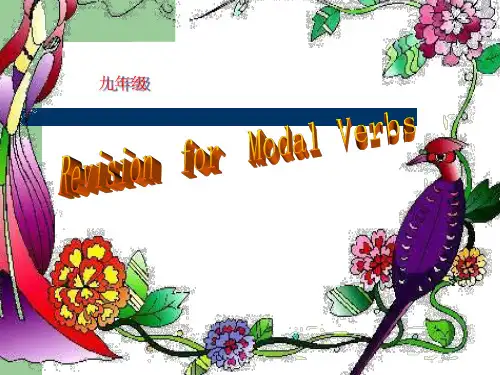
we can see his name on it .
7
4. need (需要) 既可做实义动词也可做情态动词 1)实义动词 need to do sth 需要做某事
Eg: I need to buy a big house . --- Do you need to buy a big house ? --- Yes , I do . No, I don’t . He needs to borrow a map . --- Does he need to borrow a map ?
Yes ,you may. No, you mustn’t. No, you can’t.
Yes, you must. No, you needn’t. No you don’t have to
Yes, you must. No, you needn’t
1.Must I take the keyboard to the office now ?
2) 情态动词 need do sth 需要做某事 Eg: I need buy a big house .
8
5. have to
不得不
Eg: It’s eleven o’clock . I have to go now .
He has to finish the work first .
请注意: I don’t have to go now .
--No, you __C___.Tomorrow is Saturday .You
may get up later.
A mustn’t
8.初中英语语法讲解-情态动词
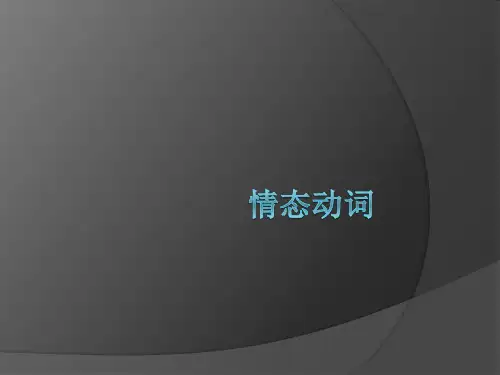
情态动词的用法-could的用法
②表示惊异、怀疑 你怎么会这样粗心 How could you be so careless?(惊异、 怀疑的情绪) 我们当时以为那个故事不会是真的。 We thought the story could not be true. (不可能)
情态动词的用法-could的用法
情态动词的用法-Can的用法
注意: a,在口语中can常可用来代替may,来询问 或说明一件事能不能做 b, can 和 be able to在表示能力这一点是 同义词, I can speak English.=I am able to speak English. 我会说英语
情态动词的用法-could的用法
情态动词的用法- must的用法
①表示“必须”或“应当”。 我们必须依靠自己. We must rely on ourselves. 你必须在四点前干完这项工作 You must finish the work before four o’clock.
情态动词的用法- must的用法
情态动词的用法-may的用法
②表示说话人的猜测,认为某一事情“或 许”或“可能”发生 我们也许今天晚上会来看你。 We may call on you this evening.
她可能不喜欢这个地方。 She may not like this place.
情态动词的用法-may的用法
Could是 can的过去式 ①表示过去的能力或“可能性” 我年轻时跑得很快 I could run very fast when I was young. (过去的能力) 我一点也听不懂他说的话。 I couldn’t understand what he said at all.
初中英语语法情态动词can与could用法“三要点”
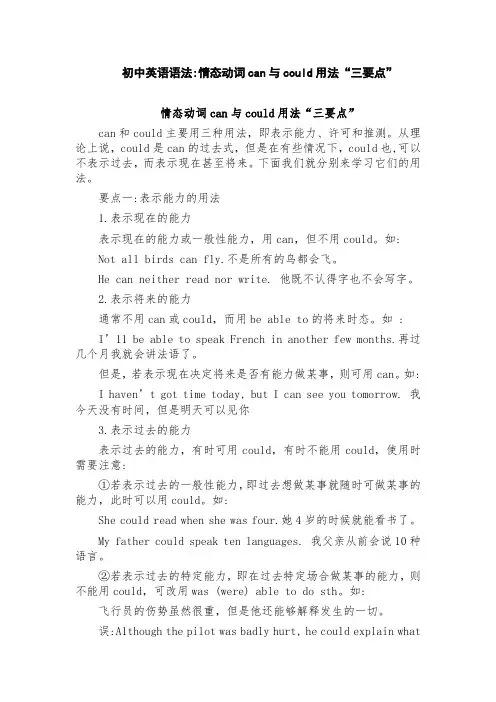
初中英语语法:情态动词can与could用法“三要点”情态动词can与could用法“三要点”can和could主要用三种用法,即表示能力、许可和推测。
从理论上说,could是can的过去式,但是在有些情况下,could也,可以不表示过去,而表示现在甚至将来。
下面我们就分别来学习它们的用法。
要点一:表示能力的用法1.表示现在的能力表示现在的能力或一般性能力,用can,但不用could。
如:Not all birds can fly.不是所有的鸟都会飞。
He can neither read nor write. 他既不认得字也不会写字。
2.表示将来的能力通常不用can或could,而用be able to的将来时态。
如 :I’11 be able to speak French in another few months.再过几个月我就会讲法语了。
但是,若表示现在决定将来是否有能力做某事,则可用can。
如:I haven’t got time today, but I can see you tomorrow. 我今天没有时间,但是明天可以见你3.表示过去的能力表示过去的能力,有时可用could,有时不能用could,使用时需要注意:①若表示过去的一般性能力,即过去想做某事就随时可做某事的能力,此时可以用could。
如:She could read when she was four.她4岁的时候就能看书了。
My father could speak ten languages. 我父亲从前会说10种语言。
②若表示过去的特定能力,即在过去特定场合做某事的能力,则不能用could,可改用was (were) able to do sth。
如:飞行员的伤势虽然很重,但是他还能够解释发生的一切。
误:A1though the pilot was badly hurt, he could explain whathad happened正:Although the pilot was badly hurt, he was able to explain what had happened.句中说的“能够”解释当时所发生的一切,显然是过去特定场合所具有的能力,所以不能用could。
英语情态动词(精华)

09徐州
—Look! Jack is crossing the street. —It ______ be him. He’s in Beijing and C he won’t be back until Friday. A. may B. can C. can't D. mustn't
(不可能是他,因为他在北京,直到周五 才回来,这是一个事实。)
may 和might在这方面的语气较弱、没有 那么肯定,表示说话人根据自己的主观意 断而进行的猜测,一般地说没有足够的客 观依据。其中,might的语气更弱一些。 例如:
As a football fan, he must watch the football match, --Brazil vs. France ,on TV at present. (说话人料定自己的推测不会有错:哪有足球迷 不看巴西队与法国队比赛的道理。)
二.牛津版教材中在Grammar出现的情 态动词: 7A Unit 6: 用can, may谈论许可; 7B Unit 5: 用can/could表达现在和过去的能力; 用can/could表达现在和过去的可能性; 9B Unit 1: 用can,could,may,might谈论请求和许可;
三. 情态动词可表达的不同含义: 1)在表示“可能性”方面 can 、should 、may 、might 可用来表示“可能性”。但在表达的语气 和程度方面越来越弱: can 和should表示以事实、理由为依据而 存在的可能性;其中should的主观性较强, 含有“应该会怎么样”的意思;而may 和 might这两个词在这方面的语气较弱些、 没有那么肯定,没有足够的客观依据。
4)在表示“猜测”方面 must 、 can 、should 、may 、might 都可以用于表“猜测”,确定性越来越小。 must的语气最为强烈,它是以事实为依据而 进行的逻辑上的推理,因此它所指的动作发 生的可能性最大。 can 和should表示以事实、理由为依据而进 行猜测,它们所指的动作有发生的可能性, 但语气没有must那么肯定。其中should的主 观性较强,往往表示说话人猜想“应该会怎 么样”的意思。
初中英语知识点归纳情态动词的愿望和请求
初中英语知识点归纳情态动词的愿望和请求情态动词(Modals)在英语中是一类特殊的动词,具有一些独特的用法和功能。
其中,愿望(wish)和请求(request)是情态动词常用的两种用法。
本文将在归纳和总结初中英语的情态动词知识点的基础上,重点探讨情态动词在表达愿望和请求时的用法和注意事项。
一、愿望的表达1. "愿望+动词原形"结构情态动词can、could和would常与动词原形连用来表达愿望。
例如:- I wish I could go to the party tonight.(我希望我能够参加今晚的派对。
)- We would like to have a bigger garden.(我们想要一个更大的花园。
)2. "希望+that从句"结构在表达愿望时,也可以使用"hope"作为动词,后接that从句。
例如:- I hope that you will pass the exam.(我希望你能通过考试。
)- They hope that it won't rain tomorrow.(他们希望明天不会下雨。
)3. "if only+主语+动词过去式"结构"if only"可以用来强调愿望的强烈程度,后接主语和动词过去式。
例如:- If only I had a million dollars!(要是我有一百万美元该多好啊!)- If only we could travel back in time!(要是我们能够时光倒流就好了!)二、请求的表达1. "请求+动词原形"结构使用情态动词can、could、will和would来表达请求。
例如:- Can you help me carry the bags?(你能帮我拿这些袋子吗?)- Could you please lend me your pen?(你能借我一支笔吗?)- Will you pass me the salt, please?(请把盐递给我好吗?)- Would you mind closing the window?(你介意关一下窗户吗?)2. "Would you like+to do"结构在表达邀请或请求时,可以使用"would you like to do"的句式。
英语情态动词的用法
初中英语情态动词详细用法归纳情态动词有具体的词义,但也同助动词一样,需要与其他词语一起构成句子的谓语,另外情态动词没有人称和数的变化,情态动词后必须跟动词原形。
1. can 的用法:(1).表示能力、许可、可能性。
表示能力时一般译为“能、会”,即有种能力,尤其是生来具备的能力,此时may 和must 均不可代替它。
如:She can swim fast, but I can’t . 她能游得很快,但我不能。
I can see with my eyes. 我用眼睛看。
(2).表示许可,常在口语中。
如:You can use my dictionary. 你可以用我的字典。
(3).表示推测,意为“可能”,常用于否定句和疑问句中,此时can’t 译为“ 不可能”。
如:Can the news be true? 这个消息会是真的吗?—Can it be our teacher?那个人有可能是我们老师吗?—No, it can’t be our teacher. He is on a visit to t he Great Wall.不可能。
咱们老师正在游览长城呢。
【例题】—I think Miss Gao must be in the library. She said she would go there. —No. She __be there, I have just been there.A.can’tB.mustn’tC.needn’tD.wouldn’t【解析】根据下文“我刚去过那儿”可知,应为“ 不可能”,can’t 表示推测[答案] A2. could的用法:(1).can的过去式,意为“ 能、会”,表示过去的能力。
如:He could write poems when he was 10. (2). could在疑问句中,表示委婉的语气,此时could 没有过去式的意思。
如:Could you do me a favour? 你能帮我个忙吗?—Could I use your pen?我能用一下你的钢笔吗? —Yes, you can.可以。
初中英语知识点归纳情态动词与非谓语动词的搭配
初中英语知识点归纳情态动词与非谓语动词的搭配初中英语知识点归纳:情态动词与非谓语动词的搭配在初中英语学习中,掌握好情态动词与非谓语动词的搭配是非常重要的。
情态动词表示一种情态或态度,而非谓语动词则包括不定式、动名词和现在分词,它们在语法和用法上也有一些固定的搭配。
下面将对情态动词与非谓语动词的搭配做一个归纳总结。
一、情态动词和非谓语动词的搭配1. Can/Could do:表示能够做某事- I can swim.(我会游泳。
)- He can speak English well.(他英语说得很好。
)- Could you please help me with my homework?(你能帮我做作业吗?)2. May/Might do:表示可能做某事- She may come to the party tonight.(她可能今晚来参加派对。
) - They might go to the park if it doesn't rain.(如果不下雨的话,他们可能去公园。
)3. Must do:表示必须做某事- You must finish your homework before going out to play.(你必须在出去玩之前完成作业。
)- We must follow the rules.(我们必须遵守规则。
)4. Should/ Ought to do:表示应该做某事- You should study hard for the exam.(你应该努力学习考试。
)- We ought to help others when they are in need.(当别人需要的时候我们应该帮助他们。
)5. Have to do:表示不得不做某事- They have to wear uniforms to school.(他们上学必须穿制服。
)- I have to finish this project by tomorrow.(我必须在明天之前完成这个项目。
初中知识点归纳情态动词的特殊用法与句型转换
初中知识点归纳情态动词的特殊用法与句型转换情态动词属于英语中的一类特殊动词,它们在句子中起到了非常重要的作用。
除了一般情态动词的基本用法外,还存在一些特殊的用法和句型的转换。
本文将就初中英语中情态动词的特殊用法和句型转换进行归纳总结。
一、情态动词的特殊用法1. 情态动词用于表示推测或可能性:(1) must/may/might/could + 动词原形例:He must be at home.(他肯定在家。
)They may go to the park.(他们可能会去公园。
)2. 情态动词用于表示请求或建议:(1) could/would you + 动词原形?例:Could you please help me?(你能帮我吗?)(2) should + 动词原形例:You should take a break.(你应该休息一下。
)3. 情态动词用于表示允许或禁止:(1) can/could + 动词原形例:You can go now.(你可以走了。
)(2) must/mustn't + 动词原形例:You must finish your homework.(你必须完成作业。
)4. 情态动词用于表示能力或可能性:(1) can/could + 动词原形例:She can swim very well.(她游泳游得很好。
)(2) be able to + 动词原形例:He will be able to speak English fluently.(他将能够流利地说英语。
)5. 情态动词用于表示意愿或命令:(1) will/would + 动词原形例:I will do my best.(我会尽力的。
)(2) shall/should + 动词原形例:You shall obey the rules.(你应该遵守规则。
)二、句型转换1. 肯定句转否定句:将情态动词的原形后加上not。
- 1、下载文档前请自行甄别文档内容的完整性,平台不提供额外的编辑、内容补充、找答案等附加服务。
- 2、"仅部分预览"的文档,不可在线预览部分如存在完整性等问题,可反馈申请退款(可完整预览的文档不适用该条件!)。
- 3、如文档侵犯您的权益,请联系客服反馈,我们会尽快为您处理(人工客服工作时间:9:00-18:30)。
否定句: It can’t fly.
Practice
Oral Practice
They can play soccer. 一般疑问句: Can they play soccer? 肯定回答: Yes, they can. 否定回答: No, they can’t.
What can ostrich do?
Parrots can repeat words very well. Parrots can’t swim. Can parrots hear very do?
Presentation
Sentences
Bats can sleep during the day and fly during the night. Bats can’t swim. Can bats make special sounds? What can bats do?
Presentation
Sentences
Hippos can kill people with their big mouth and huge teeth. Hippos can’t fly and walk. — Can hippos hide under water? — Yes, it can.
Practice
小结
Practice
小结
Production
Grammar Show
Production
小升初真枪实练
( A ) 1. My MP4 player isn’t in my bag. Where ____ I have put it? A. can B. must C. should D. would
— Can / Can’t he speak Japanese? — Yes, he can / can’t, but not well.
— Can / Can’t I use your phone? — Sure, here it is. — I am tired. Can / Can’t I sit down? Do you know whose pencil it is? It can / can’t be Ted’s. His pencil is red.
他们会溜冰吗?
__________ they skate? Can
Practice
Oral Practice
表示请求和许可: 我现在可以走了吗? 是的,可以。 不,不可以。 ______ Can I go now? can — Yes, you __________. can’t — No, you ___________. 表示客观可能性: Lucy不可能在教室里面。 Lucy ________ be in the classroom. can’t
The little boy can read books in English.
一般疑问句: Can the little boy read books in English? 肯定回答: Yes, he can. 否定回答: No, he can’t. 否定句: The little boy can’t read books in English.
Presentation
Sentences
can 其他的用法
读一读下列句子,请圈出下列句子中的情态动词
Can I come in ? 我可以进来吗?
Yes, of course. 是的,当然可以。 Can I have some sweets? 我可以吃些糖果吗? Yes, you can, and you can have some cakes. 是的,可以。而且你还可以吃些蛋糕。
( C ) 2. — Is Jack on duty today?
— It ____ be him. It’s his turn tomorrow. A. mustn’t B. won’t C. can’t D. needn’t
Production
Quiz
Production
Quiz
Presentation
Sentences
1. 肯定句:主语+can +动词原形+其他 I can dance. 我会跳舞。 2. 否定句:主语+can’t+动词原形+其他 I can’t dance. 我不会跳舞。 3. 一般疑问句及回答:Can+主语+动词原形+其他? — Can you dance? 你会跳舞吗? — Yes, I can. / No, I can’t. 是的,我会。/不,我不会。 4. 特殊疑问句:特殊疑问词+can +主语+动词原形+其他? What can you do? 你会做什么?
Practice
Oral Practice
表示惊讶、怀疑,用于疑问或否定句中。 这可能是真的吗? Can __________ it be true?
他不可能超过60岁。
can’t He ________ be over 60.
Practice
Oral Practice
圈出正确的情态动词,并朗读
Cows can give us milk.
Cows can’t run fast.
Can cows give us beef? What can cows do?
Presentation
Sentences
Koalas and polar bears can climb fast and swim fast. Koalas and polar bears can’t fly. — Can koalas and polar bears eat fish and plants? — Yes, they can.
What can koalas and polar bears do?
Dolphins can jump high and do tricks.
Dolphins can’t fly.
— Can dolphins see well and make lots of sounds? — Yes, they can. What can dolphins do?
can’t Can Can can’t can’t
Practice
Exercise 4
Can you wash the dishes?
Mary can’t sweep the floor.
What can Jim and Jack do?
Yes, he can.
My grandmother can’t bake cookies.
can在句子中表示允许,意为“可以” ,在口语中可以代替may。
Presentation
Sentences
Can you please lend me your car?
你能借给我你的车用用吗?
Could you help me with my English? 你能帮助我学英语吗?
can在句中表示请求,常用于“Can/Could you„?”句式。 can的过去式could用于现在时,可是语气更委婉,更客气。
What can hippos do?
Which animal can swim slowly and run very fast?
Presentation
Sentences
Ostrich can run very fast.
Ostrich can’t fly.
— Can ostrich swim? — No, it can’t.
Presentation
Sentences
He can’t be at home. 他不可能在家。 Can he come here today, please? 请问他今天能来这里吗?
can在句中表示可能,常用于否定句或疑问句中,指某种 可能性。
Practice
变换句型
Oral Practice
Practice
Exercise 1
Practice
Exercise 2
Birds can fly very high.
Practice
Exercise 3
can’t
Practice
Exercise 4
Can you wash the dishes?
Practice
Exercise 1
Practice
Unit 8
Modal Verb can 情态动词can
Warm up Presentation Practice Production
Warm up
Who can swim / run fast/ fly / dance/ sing / paint?
I / He / She / (Animals) can… can表达一种能力,会、能做什么事情。 今天我们来学习情态动词。
Oral Practice
We can play the piano. (就划线处提问) What can you do? They can play soccer on the playground. (就划线处提问) Where can they play soccer? I can ride a horse in the morning. 就(划线处提问) When can they ride a horse? It can fly. (就划线处提问)
Practice
Oral Practice
I can ride a horse. 一般疑问句: Can you ride a horse? 肯定回答: Yes, I can. 否定回答: No, I can’t.
